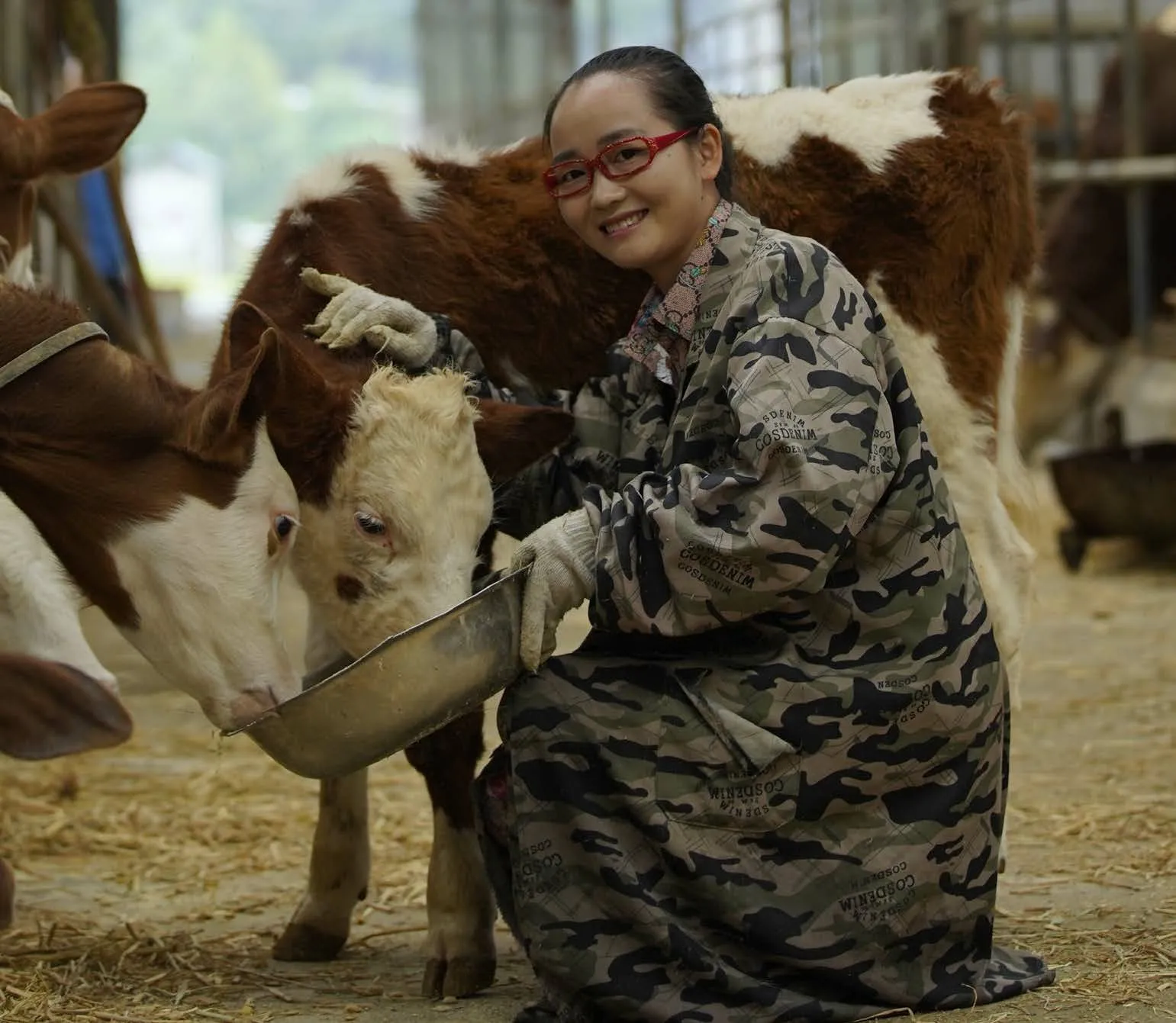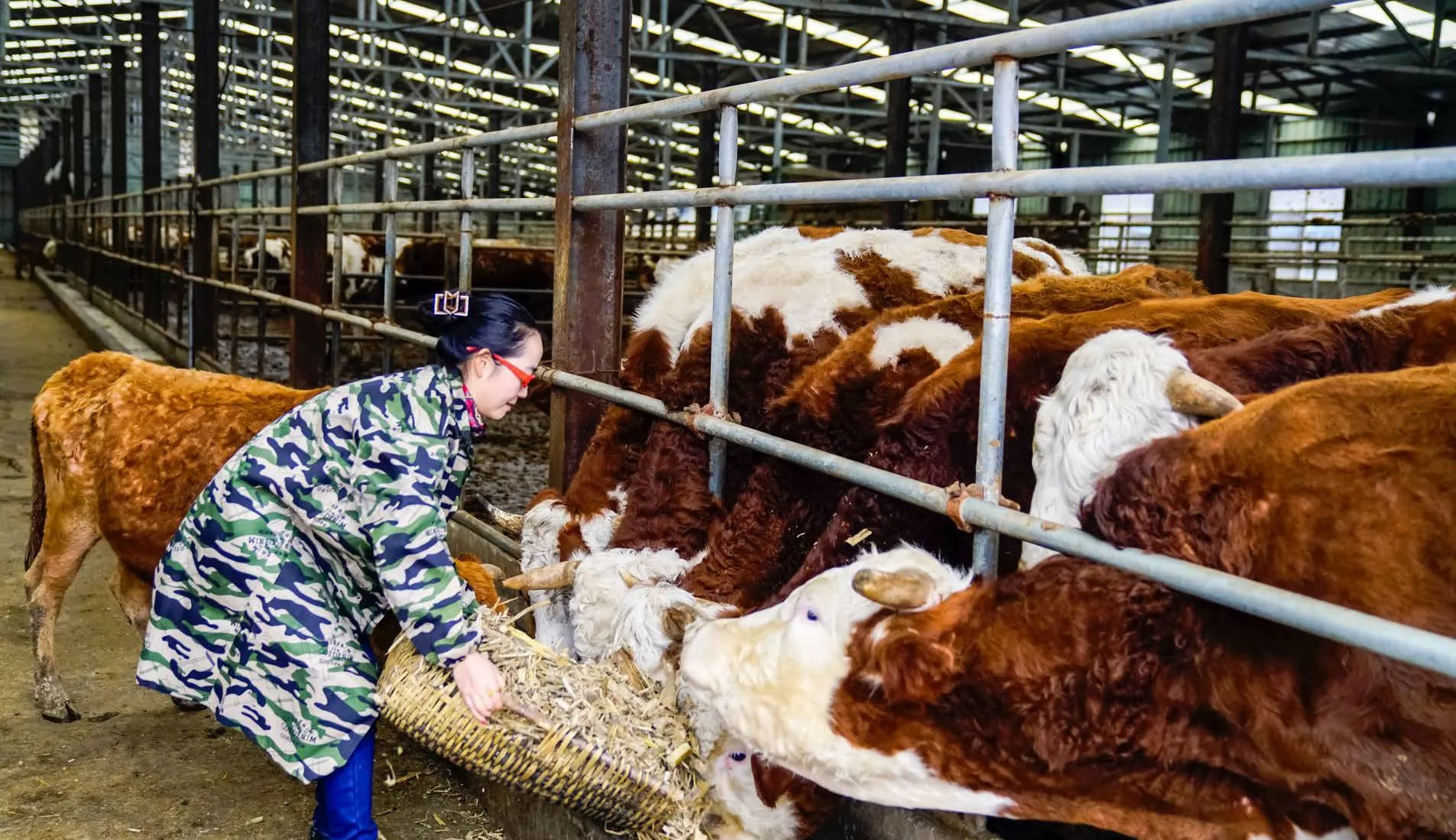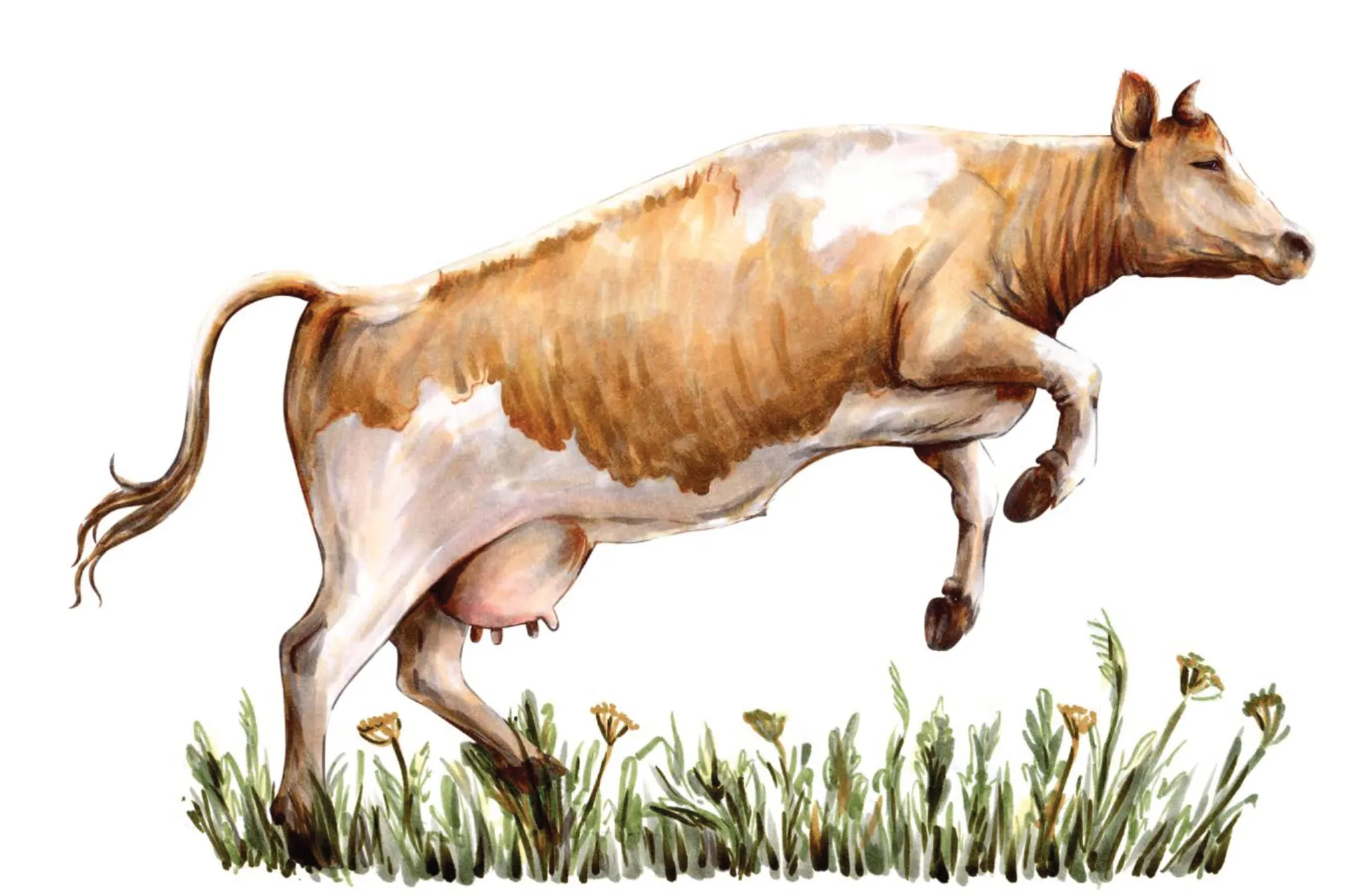From a Singer to a Cowherd
——Portrait of of Miss Xu Qunqun
Text and photos by Zhang Ouya,Zhai Xingbo,Hu Guotao &Wang Zhengxi
One day at the end of December in 2008,Xu Qunqun,who lived in a flat on Wujie Road in Singapore,suddenly received a bank notification message that 1 million Singapore dollars were put in her account.She was startled by the news,though she had expected its arrival.1 million Singapore dollars (736,431 USD) was the money she earned from performing at concerts during the Christmas season.
Just four or five years later,she returned to her hometown in western Hubei Province with her savings of over 10 million yuan (over one million USD).She lived in a wild cave on a barren mountain and became a cowherd.Another five or six years later,her cattle ranches were extended to 11 villages,leading 3,200 villagers on the road to wealth.Now,she has been awarded honorary titles such as the “Model of Hubei,” “National Outstanding Youth,” “Advanced Individual of the National Husbandry Industry,” and listed as one of the “Good People in China,” “National March 8th Red-Banner Holders,” “National Top 10 Role Models for Boosting Rural Income Via Agri-startups,” and “National Rural Youth Leaders for Obtaining Wealth.”

Xu Qunqun,one of the National Top 10 Role Models for Boosting Rural Income Via Agro-startups“全国三农创业致富十大榜样”之一的许群群
On October 13,we went to listen to her stories at a mountaintop in Hefeng County,where she unveiled her fulfilling life to us.
Becoming a Singer in Singapore
In 2004,Xu Qunqun,a daughter from a poor family of Zhangjia Village in Rongmei Town,Hefeng County,aced the College Entrance Exam (Gaokao),and was admitted to the Wuhan Conservatory of Music,majoring in folk songs and Chinese zither.Music-related majors usually cost more than others in China.Her mother Zhao Jinyan raised her and her younger brother and sister while running a small business.Knowing her mother’s hardships,Xu Qunqun studied extremely hard at school.

Xu Qunqun feeding her cattle in a cowshed许群群 在牛 圈里 喂牛
During the National Day holiday in 2007,one of her classmates told her that a performing company in Singapore was urgently seeking a Chinese folk singer,and it was a highpaying job.She immediately contacted the agent and went to Singapore on a three-month trial period at the end of November,bringing nothing but her zither.She was nearly dismissed by the end of the first month,as she often sang high-toned songs like “Snow Beyond the Frontier” and “Little Back Basket.” Though she had a nice voice,audiences were not fond of her style.She asked for another chance and tried to sing moody local songs from Southern Fujian.Her new folk style performances with her zither gained favor from the audiences who grew up with the Westernstyle music.Since then,she was often greeted with cheers and applause and sang repeatedly on the stage.
After settling down in Singapore,she gradually gained some fame,so she had more and more opportunities to perform on stage.She often performed at three or four theatres on a single night.Three months later,Xu Qunqun signed a contract with the company and became a full-time singer with a salary accounting for 60% of the revenue she created.During the Spring Festival the same year,she brought over 600,000 yuan back home for her mother and helped pay off the old debts of her family.
Then,she dropped out of school during her third year in college.During Christmas in 2008,her company arranged a solo concert season for her.Besides the ticket income,her concerts also received sponsorships and advertisements from various companies,so her company raked in a large sum of money,and she also earned millions of dollars herself.In Singapore,she was realizing her dream of being a star like her idols—Li Guyi and Yin Xiumei.
“Tricked” to Be a Cowherd
In 2013,when Xu Qunqun returned home for the Spring Festival,she had already saved over 20 million yuan.
Her mother was the only one in the village who knew the secret.In her mother’s eyes,the money was sufficient for the whole family to spend in a lifetime,so she tried to persuade her to stay at home to manage a business instead of drifting further apart in a foreign country.
Yet Xu Qunqun was reluctant to give up her dream,and she resolutely took a bus from her county to Guangzhou where she spent some 100,000 yuan on stage costumes.She had to wait two weeks before they were ready.
It was during the waiting time that her life took a new turn.
After Xu Qunqun left home,her mother secretly went to Shandong Province to buy 50 calves.Due to the long-distance transport,quite a few calves died by the time they arrived back at Zhangjia Village.
As there was not enough room to accommodate the remaining 40-odd calves,the stubborn mother sent them to her parent’s farm in Chaoyang Village in a neighboring town.However,the cowshed there was small,so she had to bring the calves to Dingjia Cave at the bottom of the Jigu Mountain.In order to look after them,her mother decided to live in the cave herself.
At an altitude of 1,680 meters,the Jigu Mountain was so desolate and uninhabited that even telephone signals couldn’t reach there at the time.Although some Zhiqing (educated youths from cities) had lived in the cave many years ago,the place was utterly bereft of human life for a long while.Upon hearing the news from her uncle seeking help,Xu Qunqun couldn’t wait for the costumes any longer and immediately booked a plane ticket to fly back to Enshi City.
It was not until many years later that Xu Qunqun knew that the incident was actually plotted out by her mother to trick her back home.
In order to accompany her mother,Xu Qunqun moved into the cave as well.
The remaining calves kept dying one by one.When spring came,there were only 23 calves left.
“It was the 23 calves that stirred up my mother to develop the husbandry industry,and she trapped me into joining her gradually,” Xu Qunqun told us,smilingly.
Playing the Zither in Front of Cows on a Mountaintop
Xu Qunqun decided to help her mother,so she canceled her plan of going back to Singapore.
Very soon,she hired dozens of villagers and some experts and purchased equipment such as excavators to build a plant.The once isolated Dingjia Cave and remote Jigu Mountain became lively at once.
When the new plant sprung up,she began to ponder.The Jigu Mountain is shrouded in clouds and mist all year long and enjoys dense forests and lush pastures.The mild weather and fresh air on the mountain would likely provide a good environment for the growth of the calves.The setting would be particularly good for the meat quality and prevention and control of diseases.Later,she made some trips to Xinjiang,Shandong,and Yunnan to gain some first-hand knowledge,and even participated in the 8th China Cattle Industry Conference,where she became acquainted with Xu Shangzhong,a researcher at the Institute of Animal Sciences of CAAS &Vice President of China Cattle Science Committee.She expanded her horizons and came to realize the huge prospects of the cattle market in China.As she built up confidence in raising cattle,she became committed to investing all her savings to run a large-scale cattle farm.
Following Xu Shangzhong’s advice,she procured 100 Simmental cattle from the northeast part of China in October of 2013.“In the truck,there were just me,who weighed only 40 kilos then,and a driver from the north.On the over 50-hour-ride home,I couldn’t even stretch my legs when I got off.But what hurt me even more was that I lost 30 calves,costing around 500,000 yuan.I couldn’t help crying when I saw the dead calves.How hard it is to be a cowherd!” Xu Qunqun recalled.
After hearing about her loss,the county government provided her with lots of support and care.Wang Xiaoping,the secretary of the County Committee,soon brought some experts in animal husbandry to Dingjia Cave for an on-site meeting.It was decided on the spot that the government would provide her with access to concrete roads,water supply,and electricity,as well as all-around technical support,and also help to go through relevant formalities.

In the second year,90% of the cows gave birth successfully.Perhaps because those new moms were too nervous,they couldn’t produce enough milk.So,Xu Qunqun boiled some soybean milk for them,which she learned could stimulate the secretion of cow milk,yet they refused to drink it.Then Xu Qunqun picked up the tub and drank a mouthful of it.After a few rounds of demonstrations,the cows finally followed suit.
When she heard that the highest quality beef imported from Australia was from cattle that grew up with music,she readily copied the method and began to play the zither for the cows,as if at a concert,to relieve their stress.According to Xu Qunqun,music can help relieve the tension in cows just as it works on human beings.After being immersed in music for some time,the cows became less and less stressed and began producing sufficient milk.
Now,she has equipped her cowshed with an audio system and loudspeakers,with which she can play music for the cows at a fixed time.
Ecological Cattle Raising Leading the Locals to Prosperity
Today,more than 800 cattle are being raised at Xu Qunqun’s ranch,and she also owns a distillery,a processing plant,and a meadow covering 2000 mu (around 13333 acres).She now breeds cattle for a dozen nearby villagers.This year,she plans to invite 200 more households to her cattle-raising program.
Over the years,she has helped 3200 households from 11 villages get out of poverty.
In addition,more than 100 villagers are employed in her breeding sites,which offer a fixed salary of 3000 yuan per month along with free meals and accommodation.The company has adopted a new pattern of ecological breeding—they feed the cattle the smashed corn stalks and residues left in the still after distilling spirits.It has resulted in thriving production and product sales,with live cattle being sold to places like Fujian,fresh beef being sold in neighboring areas,and sliced dried beef being sold all over China via e-commerce platforms.Thanks to the ideal living conditions on the mistshrouded mountain,the meat quality of the cattle is excellent,and a bull weighing around 1000 kilos can be sold at 50,000 to 60,000 yuan,or at a higher price when processed into beef jerky or other products.
In 2019,Xu Qunqun sold 500 cattle;along with the revenue from wine-making,she has earned a total sum of 42 million yuan.Her next three-year-plan is to raise 10,000 cattle,with 3,000 living in the base,and 7,000 raised by nearby villagers.
As time goes by,the villagers,who once had doubts about Xu Qunqun’s cattle raising business,have changed their minds and are now deeply touched by her diligence and persistence.During the harvest season,villagers from Swallow Village,Dongjia Village,Chaoyang Village,and other neighboring villages send their cornstalks to her as fodder for free.“Being born and raised in a rural area,I’ve witnessed the poverty of my hometown and sensed the hardships of my fellow villagers.Seeing their faces will always remind me of the responsibilities on my shoulders,” Xu Qunqun said earnestly.
“The sun rises over the Songshan Mountain Valley,
Morning bells startle the birds in flight,
Creeks are murmuring within the woods,
And green grass is swaying on the hillsides…”
This is the theme song of the movieShaolin Temple.It is called “The Shepherds’ Song,” which Xu Qunqun sang in Singapore.But now,she has resigned from her job as a singer,and stepped onto a new stage in her life,fulfilling her new dream among the mountains and rivers.

